CIVIL War Captain's Diary Letter Photo & Memoir Group 21st Wisconsin Infantry

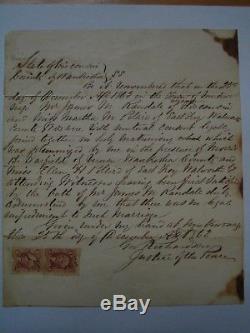
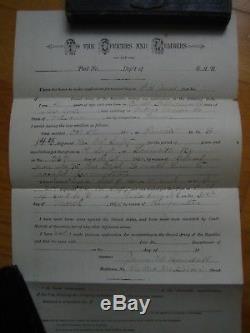
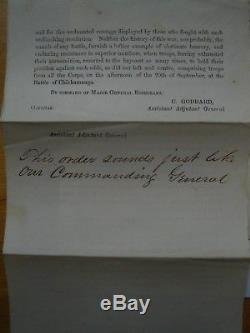
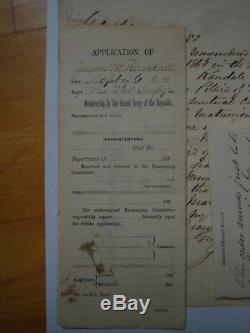

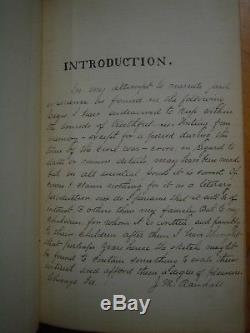
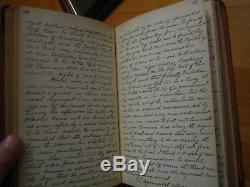
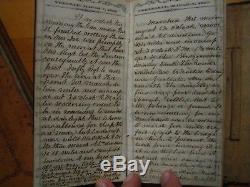
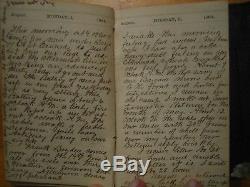

SUPERB CIVIL WAR GROUP OF DIARIES, LETTERS, PORTRAIT PHOTO AND ORIGINAL LEATHER BOUND HANDWRITTEN MEMOIR BELONGING TO CAPTAIN JAMES M. Consists of three Civil War-dated diaries kept by Randall (21st Wisconsin Infantry), one war-dated diary kept by his wife, a leather-bound manuscript memoir written by Randall later in life, a large photograph of Randall in Union uniform, Civil War-dated letters, and various other documents.
This archive has been well-preserved and contains marvelous accounts of the numerous battles participated in by Randall, as well as a daily record of his march with General Sherman during the Atlanta campaign, the march to the sea, and, finally, the Carolinas campaign. Was twenty years old and living in Weyauwega, Wisconsin, when he volunteered in the U. Army on October 5, 1861. He was commissioned into Co.
G of the 21st Wisconsin Infantry in August 1862 and was later promoted to captain. Along with his regiment, Randall fought at the battles of Nashville, Stones River, Chickamauga, Kennesaw Mountain, and Jonesborough, as well as many smaller skirmishes, including those while marching to Savannah and through the Carolinas. The captain resigned from the army on April 2, 1865, seven days before Lee's surrender at Appomattox Courthouse. Randall's diaries, letters, and leather-bound manuscript give important details about the battles in which he participated, as well as giving a daily account of his life as a Northern soldier experiencing the war-torn South.The three diaries, written mostly in the present tense, are dated 1863, 1864, and 1865 with entries for most days. Randall, accounting for much more than just the daily weather, records new recruit arrivals, the names of soldiers killed, marching objectives and distances, camp particulars, battle details, and more. The 1863 diary begins with the following entry on January 1 concerning the Battle of Stones River in Tennessee. This day finds me with my Regt. And participating in the Bloody Battle of Stone River.
We were not actively engaged, but hourly expected to be throughout the whole day. We were under very heavy fire a part of the day. At night our Regt goes on Picket, our orders are to shoot every thing we see move in front.I think I shall remember this day full as long as I remember any. The following day Randall recorded.
Our Brigade is part in support of [Captain Cyrus] Loomis Michigan Battery which is planted on our centre. The Rebels attack our Left at 3 oclock. A very heavy fight which last until Sunset, when the Rebels were thoroughly routed, with heavy loss. [January 4] As soon as light it is ascertained that the Rebels had Skedadled from our front.
Parties were sent out to bury our dead. While marching through Tennessee, Randall heard stories of abuses by Confederate sympathizers towards Union sympathizers. He records one such story while camping at Murfreesboro, Tennessee, on April 30, 1863.Our Brigade was stationed at a point, for four days, where the people were about all Union. And my friend I tell you what it is, they were strong. One old lady told me how that her husband had been shot in his own house, and that the same [Rebel] men which commited the outrageous act had boarded at her house, compeling her to feed, and wait upon them until she and her family was reduced almost to starvation. All this because they were a Union family. I tell you Uncle Sams Boys were warmly received in this neighborhood.
Randall participated next at the Battle of Chickamauga nine months later, recording on September 19, 1863, that his company. Moved forward in line of battle. We soon became engaged our Brig lost heavy and became somewhat broken for a time. I was ordered with my Co to take charge of [160] prisoners which I did.Beginning in the winter of 1863 and lasting through the spring of 1864, Randall served as a recruiting officer in Oshkosh, Wisconsin. Later in his manuscript (page 113), he complained that. One at Oshkosh could scarcely realize that a bloody Civil War was being waged in our land, though the town had sent many soldiers to the field, and had mourned the death of a number who had fallen.
But the spirit of gaiety seemed to prevail at home. " He used this time near home to marry his sweetheart, Mary "Mattie Pollird, on Christmas Day 1863. Randall's first major engagement of the campaign was at the Battle of Kennesaw Mountain in June 1864, but days before the battle, his company was ordered. To advance our line of skirmishers through an open field and occupy a ridge fortified and held by the enemy. I gave the order move forward. The boys go with a will. But as soon as we gain the open field we can at once see that The enemy are too strongly posted in their Rifle Pits to be driven out by skirmish line. Accordingly we fall back under cover of wood.On the 27th, the day of the main battle, he records; Today a grand charge is to be made at 10 oclock A. By Hookers (20th) Corps assisted by Jeff.
Davis 2d Divisions of the 14 Corps The charge is. [illegible] with very heavy loss to us and only in part successful. We receive orders to be ready to move out and relieve the 2d Brigade of our Division who are in front. We will move at dark.The Rebels, though, retreated before fighting resumed. As Sherman's forces continued relentlessly toward Atlanta, Randall's brigade was sent some twenty miles south of the city to destroy rail lines and roads near Jonesborough. There, they met some resistance from Confederates as recorded on August 31.
Our Brig moves three miles in line of battle along R. We drive the Rebels before us without any trouble. Object of this move is to destroy the Rail Road. There is pretty heavy fighting all the afternoon in direction of Jonesboro.[September 1] Our Brigade is detached as Train Guard. Heavy fighting five or six miles to the east of us. We hear all sorts of rumors regarding it but nothing authentic. [September 2] 1 oclock P. When we receive orders to march to.
We move at once, distance seven miles, a little south of east. Hospital where we see many of the 1st Wis.We learn the loss in our Div was 250. The old 14th Corps has covered itself with Glory again. Jonesboro was once a pleasant place, but now how changed. The battle was here and the town is now in ruins.
[September 3] Gen order from Sherman announces the capture, or rather the evacuation of Atlanta and its occupation by Gen. Slocum's forces also that the rebels destroyed their Magazines also 80 car loads of Ammunition. Days later, Randall's regiment marched back north and camped near Atlanta, which was now under Union control. On September 9, the captain records that he and another officer rode into the southern city and went. Every where we see the effects of our shell thrown during the siege.Atlanta was once a beautiful city, famous for business or pleasure, but now how changed. It is nearly ruined, everything wears a desolate appearance. " Several days later on September 15 he continues his observations of Atlanta: "I go to the city of Atlanta today.
I walk about the city a considerable, see much of the Rebel Fortifications, they are first rate... Many sitizens are to be seen in the city yet, although all are making preparations to leave. Everywhere in the city can be seen the effects of our shell[s] thrown during the siege.Close by the side of every house is a bomb pit. From Atlanta, he and the 21st Wisconsin marched with Sherman to Savannah. Arriving on December 22, 1864, Randall noted the appearance of affluence in the city, March this morning at 9 o'clock. We go Seven miles, passing through the City of. And camp for the night.
Savannah is indeed a handsome city. The general appearance of the place denotes great wealth. A great many sitizens remain in town.
Throughout early 1865, Randall's regiment continued their long marches with Sherman on his Carolinas campaign, but Randall would not see the war through. He resigned and left for home on April 3, 1865, days before the war ended. While traveling through Chicago on his way home to Wisconsin on April 10, he learned that General Lee had surrendered. The Glorious news received late last evening of the Surrender of Lees intire Army is being celebrated today throughout the land. The remainder of his 1865 diary contains daily accounts of Randall's work on his own farm.
The following items accompany the soldier's three diaries. (1) Randall's handwritten 278-page manuscript memoir, which was an attempt to narrate past experience. Randall divides the memoir into eighteen chapters, beginning the first with his birth in New York. After writing of his youth, he recounts his experiences in the Civil War, relying heavily on his war-time diaries.
According to his manuscript (and diary), he bought a 120 acre farm in Wisconsin shortly after his marriage in December 1863 while serving as a recruiting officer in his home state. When the manuscript ends, Randall and his family live in Chicago where his son attends Northwestern University and his daughter attends high school."Twenty-eight years of contentious work upon our Missouri farm entitled us to the benefits of a vacation, " he writes. Also a copy of most of this in a Word document that can be supplied in on CD so can be edited. I guess Randall intended to publish but never did. (2) Six war-dated letters between Randall and his wife, Mattie.
The letters are dated April 19, 1863 (from James); April 30, 1863 (from James); August 30, 1863 (from Mattie); October 18, 1863 (from James); October 19, 1863 (from Mattie); and March 30, 1864 (from James). (3) A photograph of Randall in Union uniform, framed and matted to an overall size of 10" x 12". The photograph might have been taken on March 15, 1863, when Randall records in his diary, Sergt. (4) Mattie Pollird's 1863 diary in which she punctiliously kept an account of most days. A student that year, the young woman recorded her blossoming relationship with Randall, though her accounts cease in December when they were married.Their marriage certificate, dated December 25, 1863, and signed by the justice of the peace, is also included. (5) Printed General Orders No. 227, dated October 2, 1863, issued By Command of Major General [William] Rosencrans. " Handwritten at the end, "This order sounds just like our Commanding General.
The orders congratulate the Army of the Cumberland for their efforts at the Battle of Chickamauga. (6) Randall's application for the Grand Army of the Republic, ca. The veteran has completed and signed the application, which contains information on his positions, promotions, and resignation. A fantastic and complete group. The more I read about this young Officer, the more I liked him, he seems very modern thinking (just 25 at the end of the War), one of the more poignant points is that during the Atlanta Campaign he saves a Slave who he employed as a servant for the rest of the War and promises to employ him at home after, when the War ends he tells o the difficulties they have getting him North through Union lines. Ex Heritage Auctions, Dallas 2010 in which this was one of the star lots. SEE MY OTHER AUCTIONS FOR MORE MILITARIA. PLEASE NOTE; If you have any questions and require more images please get in touch. The item "CIVIL WAR CAPTAIN'S DIARY LETTER PHOTO & MEMOIR GROUP 21ST WISCONSIN INFANTRY" is in sale since Sunday, July 15, 2018. This item is in the category "Collectibles\Militaria\Civil War (1861-65)\Original Period Items\Photographs". The seller is "albatrosj1" and is located in Paisley.This item can be shipped to United States, all countries in Europe, Canada, Australia.
- Country/Region of Manufacture: United States

